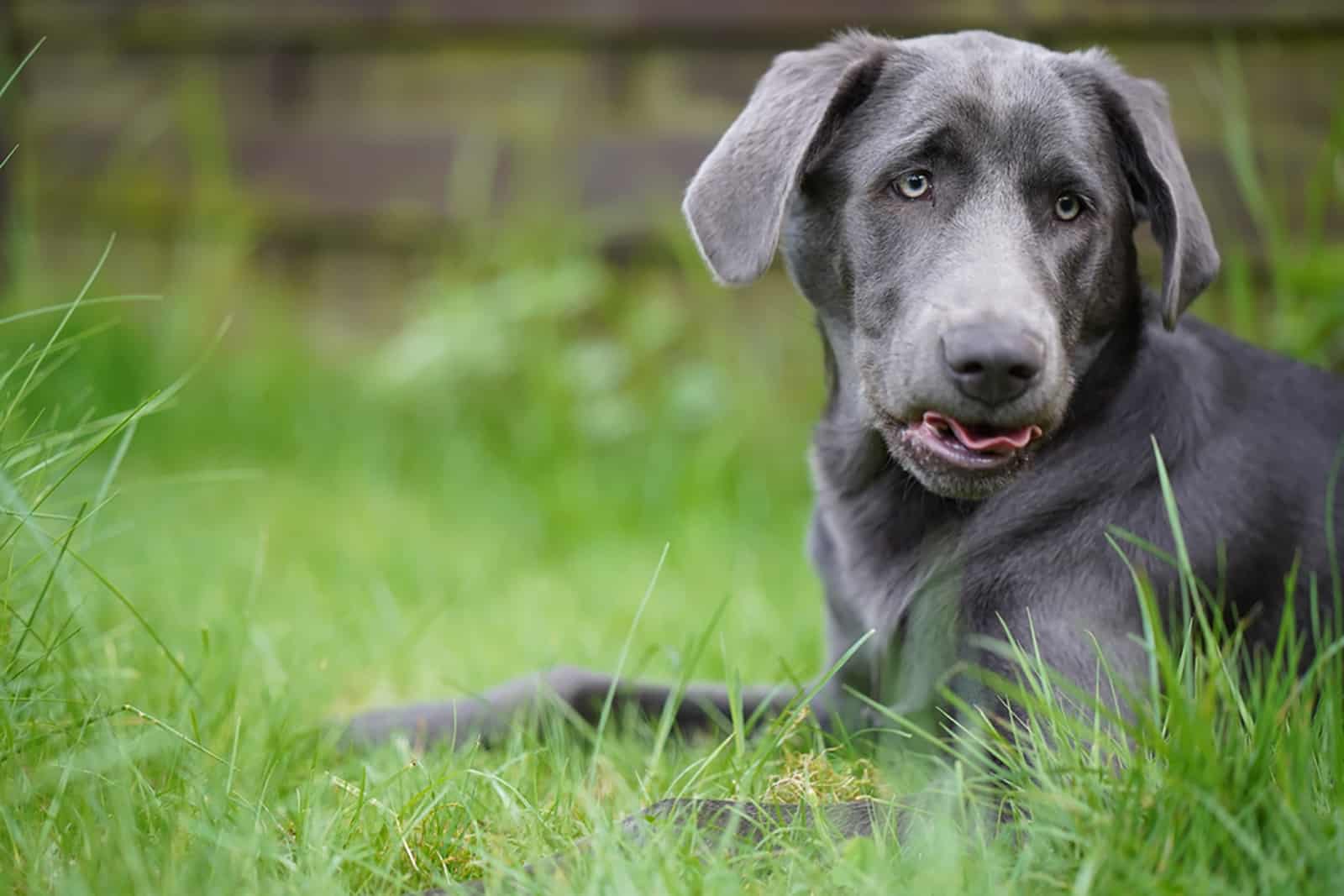What on earth is a charcoal Lab? Did a white Labrador roll into a charcoal pile and turn into a charcoal Labrador, or is this Labrador simply born like that?
Well, depending on how you look at it. The charcoal Lab can indeed be a regular white Labrador that seems to have rolled into charcoal. But, it can also be a distinctive Labrador Retriever color that nobody seems to talk about.
As luck would have it, that’s something now we want to talk about today — charcoal being a unique Labrador Retriever color.
Now, I don’t know about you, but I still haven’t had the chance to see a charcoal Lab in person because they are so rare.
That won’t stop us from diving into the world of charcoal Labrador Retriever dogs!
What Is A Charcoal Lab?
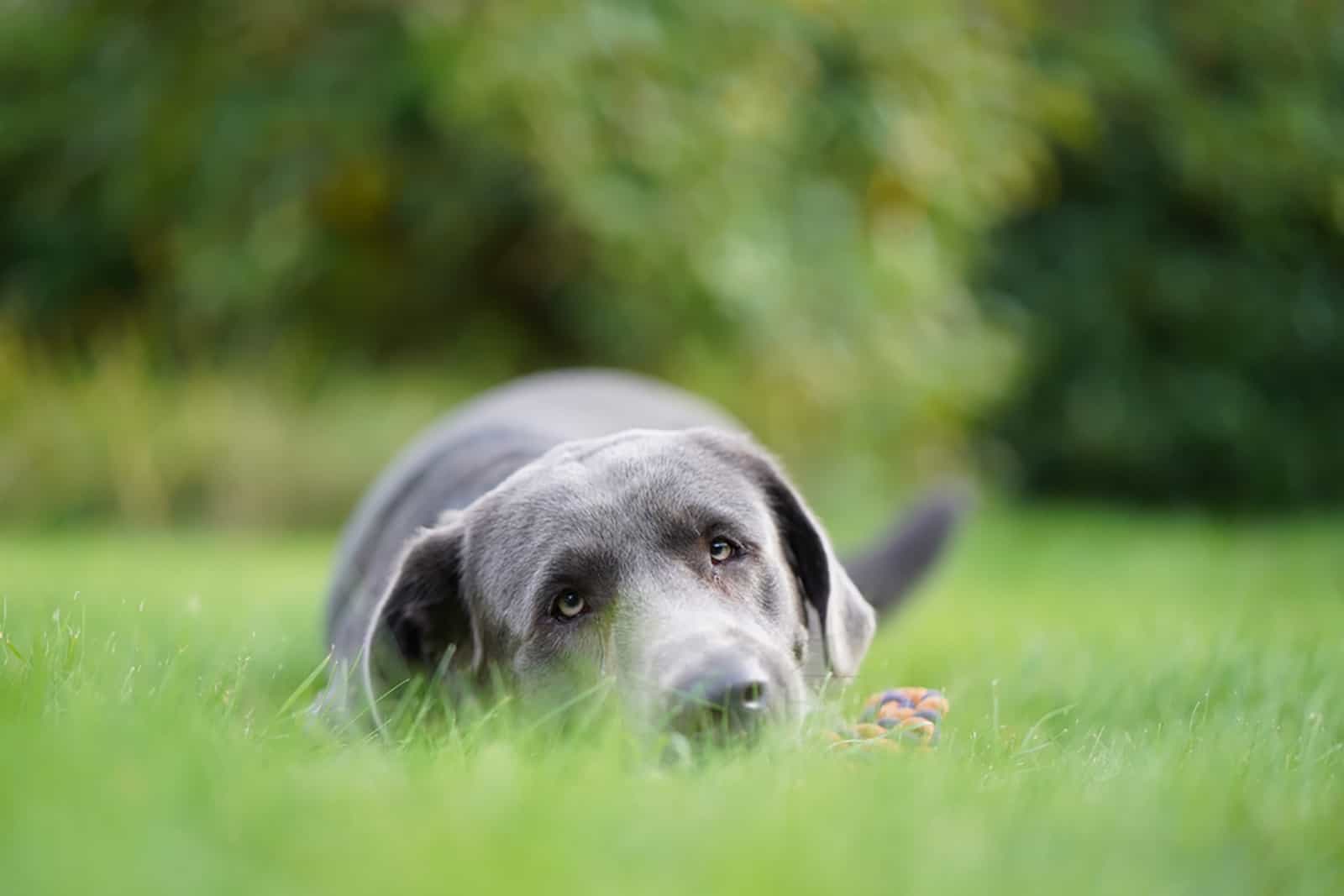
To put it simply and officially, the charcoal Lab is a purebred Labrador Retriever that happens to inherit a unique coat color.
So, for those who are wondering if a charcoal Lab is a Labrador mixed breed — no, it is not.
In fact, the charcoal Lab derives from two purebred Labrador Retrievers that can be of any coat color because a recessive gene is responsible for this specific color. This coat color looks exactly what it sounds like — it is gray, with silvery and ashy tones.
What Is The Difference Between A Charcoal Lab And A Silver Lab?
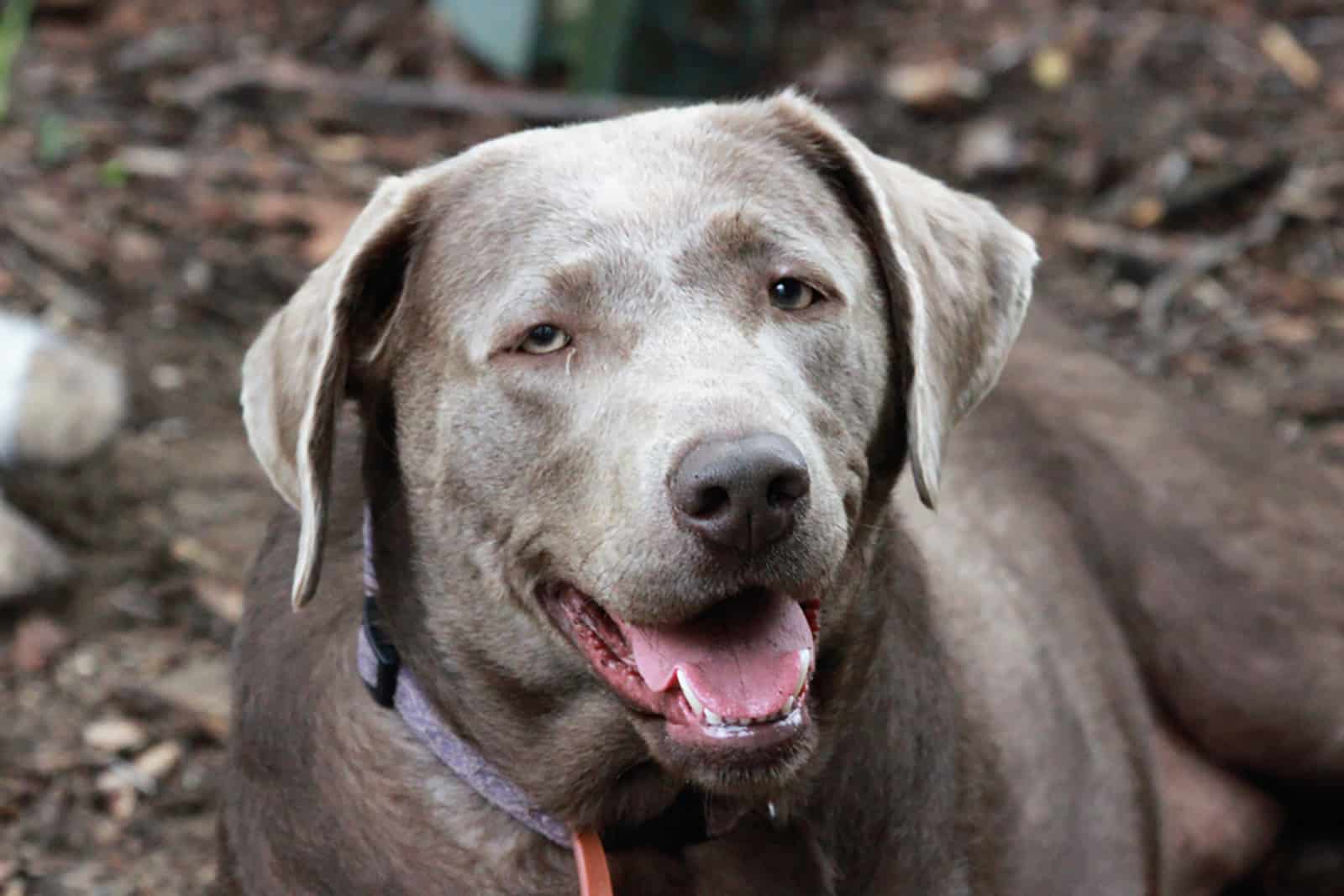
I am glad that you have asked! Most of us are not sure what the difference is between silver and gray dogs in general, let alone silver and charcoal Labs.
Let’s first begin by saying that charcoal is not one of those standard Labrador Retriever colors like yellow, white, and black.
The charcoal color derives from Labradors that carry genes that regulate black color. In other words, charcoal Labs are diluted black Labs. That said, it is incorrect to say that a charcoal Labrador Retriever puppy inherits a “silver color”.
When it comes to silver Labs, these Labrador puppies derive from chocolate Labradors. So, silver Labrador Retrievers are chocolate Lab dilutes. And there’s the difference between charcoal and silver Lab puppies!
Is A Charcoal Lab The Same As A Black Lab?
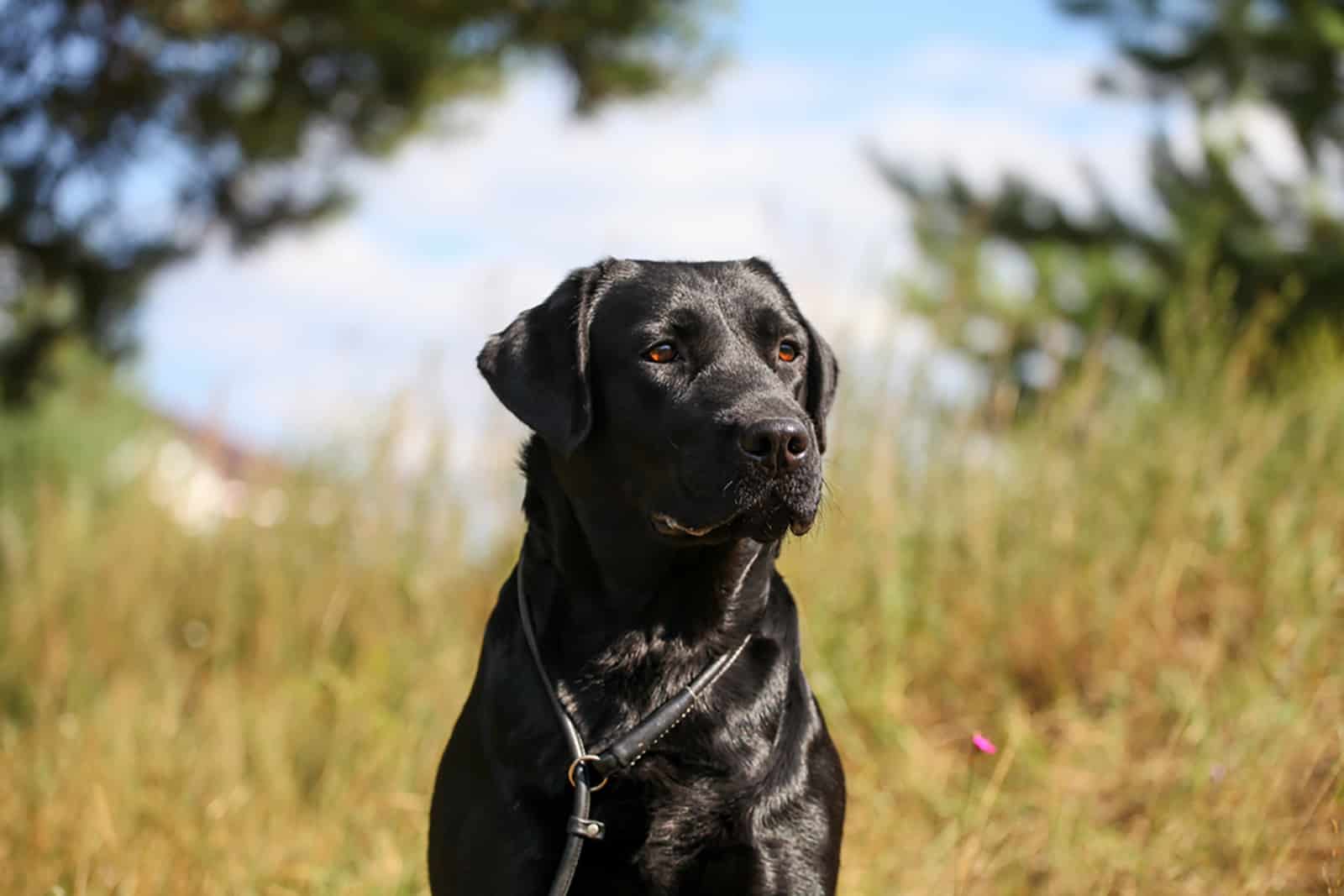
While a charcoal Lab is not the same as a black Lab, it does originate from one. The dilute gene of a black Labrador Retriever is what causes the charcoal coat color in its offspring.
Just to get a clearer picture, take a look at Weimaraner colors — they all derive from the same dilute gene we see in the charcoal Lab dogs.
Some people even believe that charcoal Labradors are developed by crossing Weimaraner dogs with yellow Labradors (which is not true).
Charcoal Lab Appearance
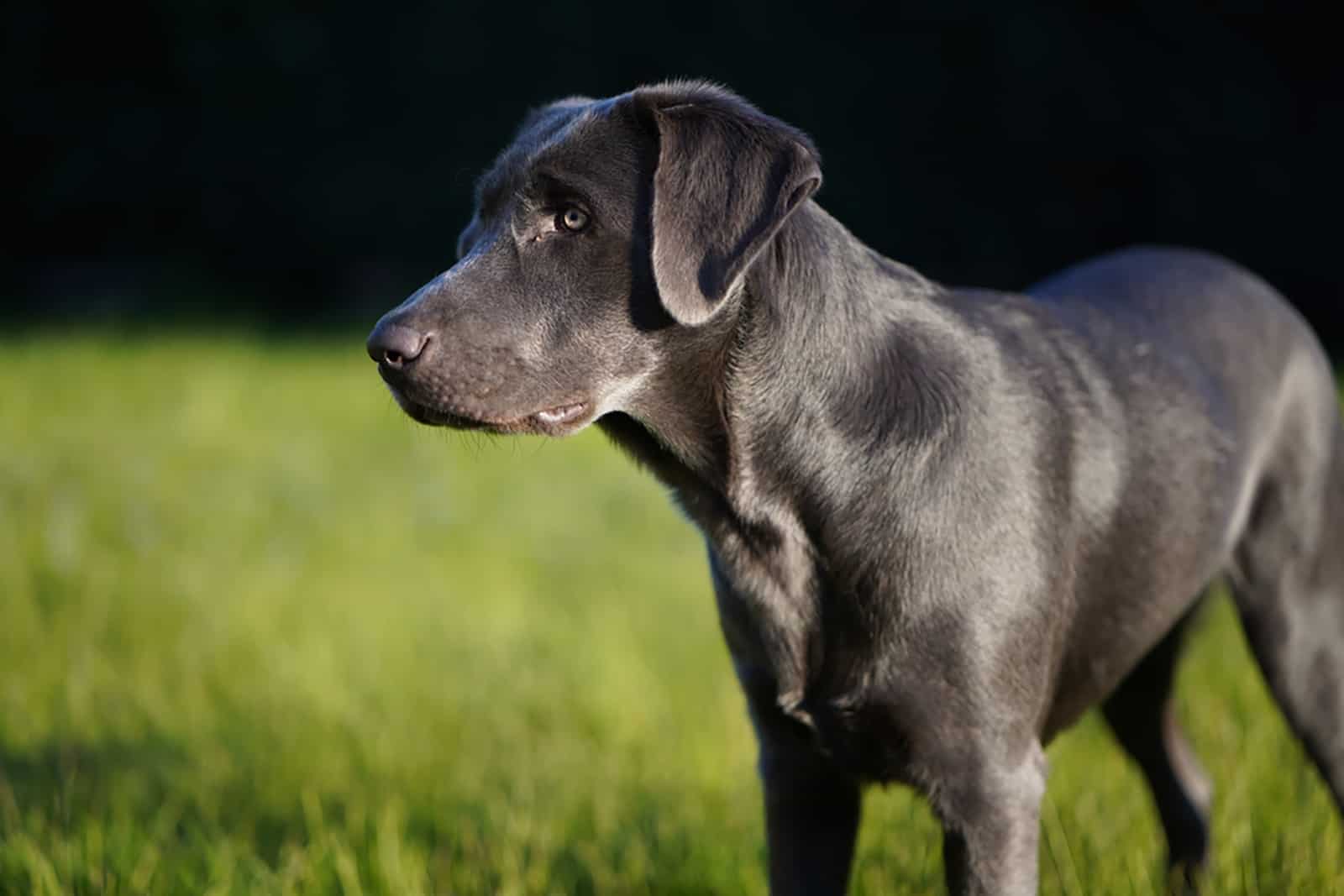
At first glance, you might think that it is a black Labrador, but once you take a second look, you notice that its black coat is a bit diluted. Well, that’s a charcoal Lab for ya’!
As we previously mentioned, the charcoal Lab may look similar to the Weimaraner in terms of coat color. However, most charcoal Labs come in darker shades of gray/ashy colors.
When they are born, charcoal Lab puppies have blue eyes. The majority of these puppies grow into adult charcoal Lab dogs that either retain their blue eyes or their eye color changes to hazel to light brown.
Generally speaking, the charcoal Labrador is one of the blue-eyed dogs.
Size
When it comes to size, the charcoal Lab is no different than any other Labrador Retriever. Of course, there is a slight difference between male and female Labradors of charcoal color.
Depending on the breeding program and bloodline, the charcoal Labrador can be a medium to large dog. That said, the charcoal Labrador is not as small as a standard Poodle, but it is not as large as a Newfoundland.
They’re simply somewhere in between!
With a height of 21.5 to 24.5 inches and a weight of 55 to 80 pounds, the charcoal Labrador Retriever walks confidently beside its owner.
Body Shape
The charcoal Lab, just like other Labrador Retriever dogs, inherits a powerful tail that looks similar to an otter tail! And it is as strong as an otter tail!
With its otter tail positioned up high, the charcoal Labrador Retriever greets fellow dogs and humans with its expressive puppy eyes. Oh, not to mention the drop ears that change position whenever the charcoal Lab hears something interesting!
Moving on to its head, the charcoal Lab inherits a broad and sturdy skull with powerful jaws that they use to catch all the toys!
Charcoal Lab’s head features beautiful triangular ears that fold and drop downwards, along with the cutest dark brown to black nose.
The overall body shape of a charcoal Lab can be described as stocky and powerful, but it can quickly turn into the shape of a barrel — charcoal Labs are prone to obesity!
Charcoal Lab Coat Type
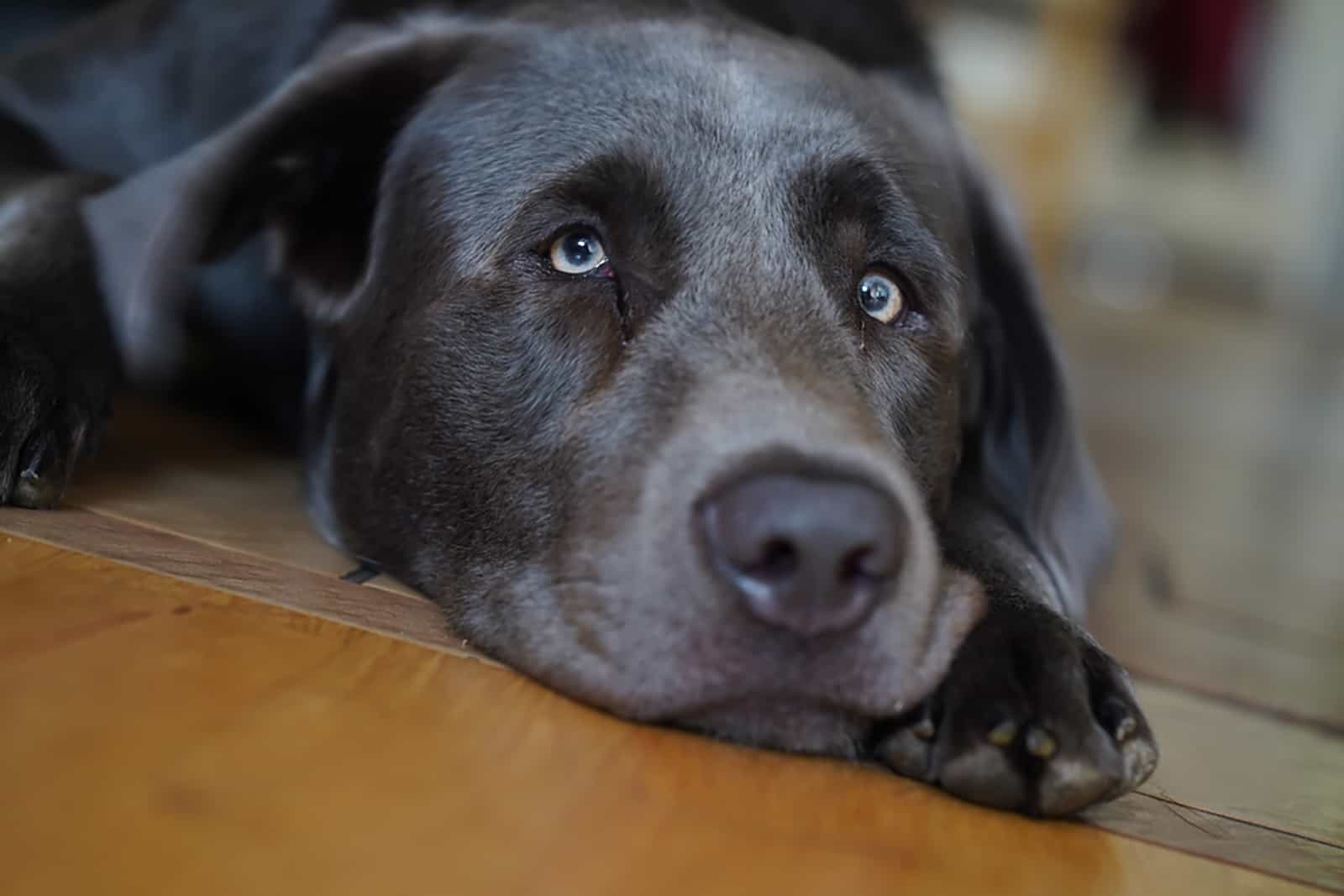
The charcoal Lab inherits a double coat — a wiry overcoat and a snug undercoat. That said, the charcoal Lab is not as soft to the touch. But, that doesn’t matter, does it?
When it comes to coat color, both coat layers are colored in the same shade of charcoal. There are no different colored hairs of both coat layers except when the charcoal Lab is growing older (white hair alert).
Charcoal Lab Shedding
Let me tell you straight ahead — you’re in it for a lot of charcoal fur shedding! Yep, being a double-coated dog breed, the charcoal Labrador Retriever is prone to moderately shed.
As with most double-coated Fidos, the charcoal Lab sheds the most during fall and spring.
Charcoal Lab has short and straight hairs that can turn your furniture into a gray to ashy color! Brushing regularly and taking your charcoal Lab to a professional groomer will help maintain its beautiful ashy coat.
Are Charcoal Lab Dogs Hypoallergenic?
Not really. Charcoal Labs are not hypoallergenic like Yorkshire Terriers and Poodles are. Charcoal Labs have high-shedding coats, but that’s not all — they produce more drool than smaller dogs.
So, allergy sufferers won’t really like to be around the charcoal Lab due to all the sneezing and watery eyes.
But, they will surely want to hang around with a charcoal Lab because of its amazing personality.
Charcoal Lab Personality
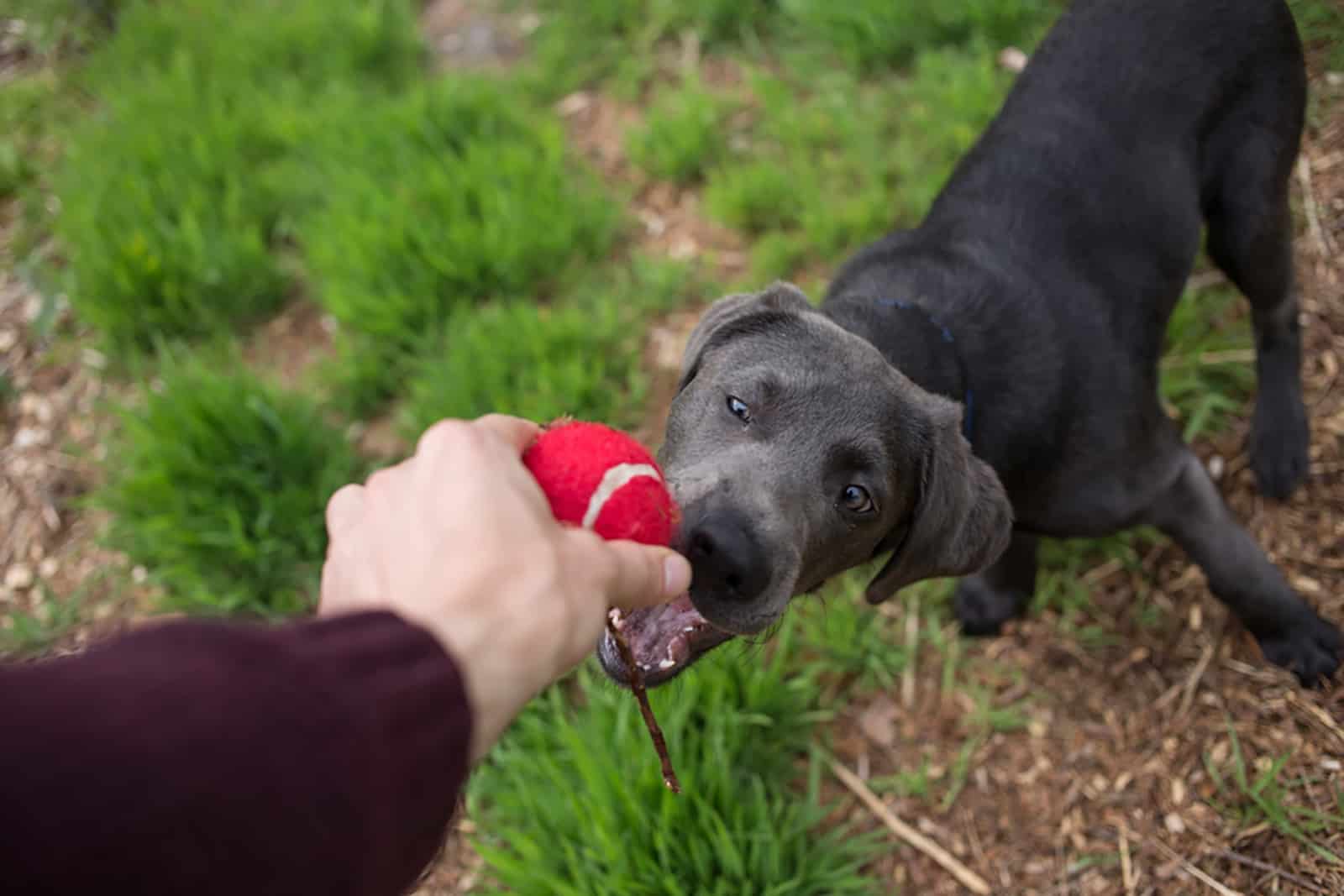
We have finally come to the best part of our article — the charcoal Lab personality! So, where should we start?
Firstly, the charcoal Lab is a very smart pooch that learns quickly. Secondly, the charcoal Lab is an incredible family pet that is going to make everyone around it laugh!
And last but not least, the charcoal Lab is a fun companion to bring on all of your outings and adventures.
Here’s what we have to say about the charcoal Lab personality in-depth:
Fast Learner
Don’t let its goofiness and sociable nature fool you — the charcoal Lab is one fast learner! That is right, you are looking at one of the smartest dog breeds in the world.
The charcoal Lab will pick up commands very quickly, especially if you have a doggy treat up your sleeve! Charcoal Labrador puppy training should start as early as six to seven weeks of age — we can’t let all that potential sit still!
With such intelligence, the charcoal Lab needs constant mental stimulation. Be ready to buy some puppy puzzles!
Besides being a fast learner, the charcoal Lab is a very outgoing dog that enjoys being around both humans and other dogs. This is accomplished if the charcoal Lab is socialized at an early age.
So, don’t be shy, bring your charcoal Lab everywhere with you because I guarantee you two will steal the spotlight wherever you go!
Wonderful Family Dog
We all know that this lovely dog breed has the reputation of being the number one family-friendly dog breed in America. No wonder, really, because Labrador Retrievers are simply amazing family dogs.
The charcoal Lab is no exception — its family-oriented personality is what we are all looking for in a dog. That said, the charcoal Lab will do just about anything to show its human pack how much it loves them.
Charcoal Labs will want everyone’s attention and they will make sure to stay in the center of it.
But seriously, who can resist seeing a cheerful charcoal Lab that is on its way to greet you? Such a good boy!
Its cheerful and loving personality is what makes the charcoal Lab ideal for children. It gets along well with the youngsters, but playtime can sometimes become a little too ruff for smaller children.
The charcoal Lab is a large dog, and we must keep that in mind because it can easily knock down a small child during playtime. It will not do it on purpose — charcoal Lab puppies get the zoomies that are hard to handle!
Adventurous Canine Companion
Even though we got accustomed to the Labrador breed being at the top of the best family dog breeds, we tend to forget that these pooches were bred and raised as gun dogs.
Besides Labs, Golden Retrievers, Chesapeake Bay River Retrievers, and Nova Scotia Duck Tolling Retrievers are all known as incredible working dogs that love water so much that they have earned the title of amazing water dogs.
Charcoal Labs are very active and outgoing dogs that love to be in nature. That said, you won’t be bored if you decide to take your charcoal Lab on a hiking trip.
So, due to the fact that the charcoal Lab is a Retriever breed, it will show remarkable willingness to play in the water and even retreat games!
Don’t be surprised if you see a charcoal Lab with a duck in its mouth, proudly getting out of the water to show its human what it has just caught! Although it is your loving pet dog, the charcoal Lab is still a great hunting dog!
Charcoal Lab Health Issues
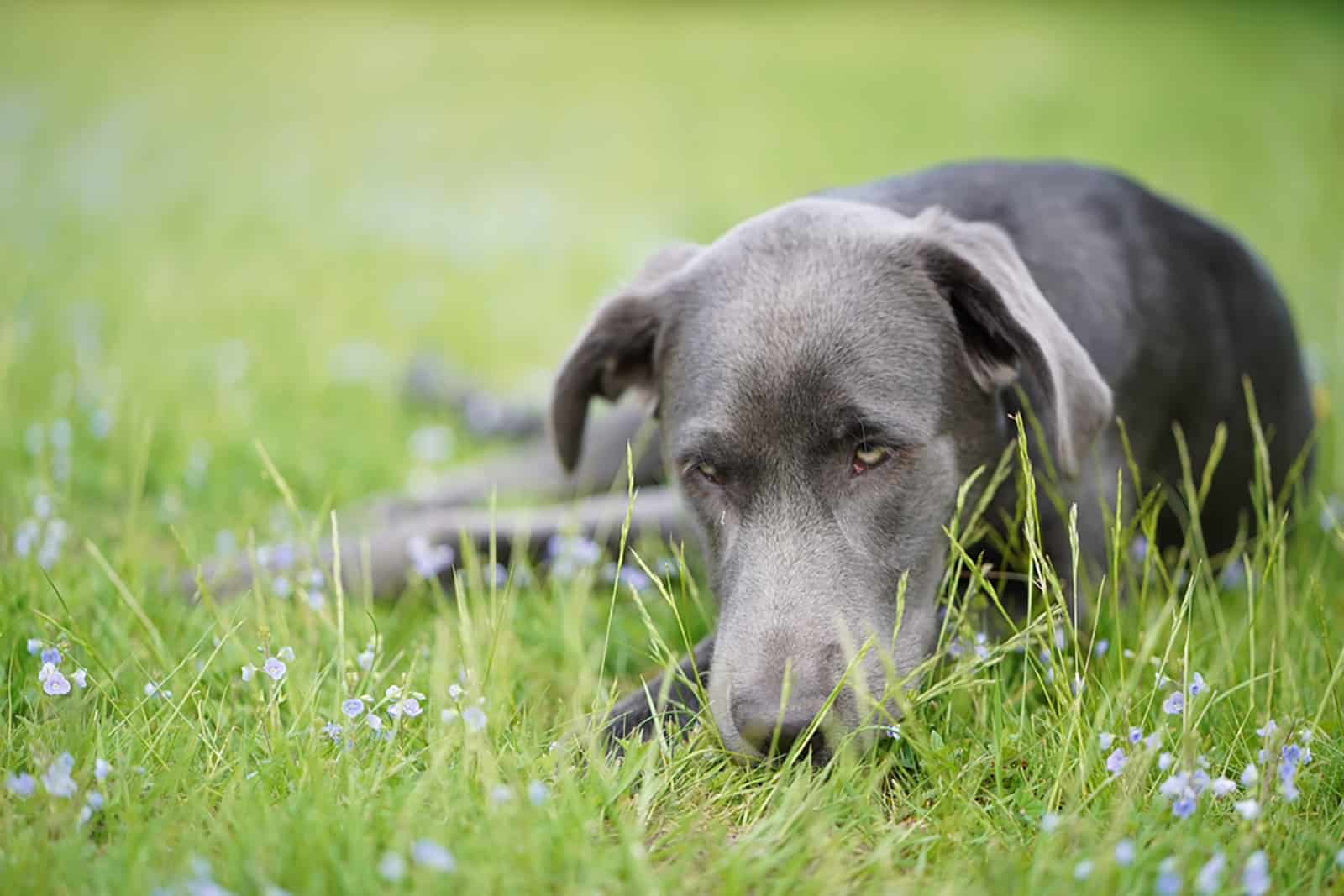
Charcoal Labs are known to inherit several Labrador Retriever breed-specific health issues:
• Obesity
• Elbow dysplasia
• Bloat (GDV)
• Eye problems
• Canine epilepsy
It is really a bummer when you realize that Labrador Retrievers are not as healthy as we truly want them to be. Charcoal Labs are thought to be less healthy than other colors of the Labrador breed.
A study on the Labrador Retriever dog breed explains that black and chocolate Labs are more prone to inheriting ear and skin diseases, as well as canine obesity.
And we know that charcoal and silver Labs derive from these two which means that they have increased chances of inheriting the same health problems.
Besides ear and skin diseases, charcoal Labrador Retrievers are prone to canine alopecia and follicular dysplasia.
Most reputable Labrador breeders take their charcoal Lab puppies for DNA health checks in order to prevent a hereditary disease from developing.
However, it is very difficult to tell if your charcoal Lab dog is going to be 100% healthy throughout its whole life.
Charcoal Lab Lifespan
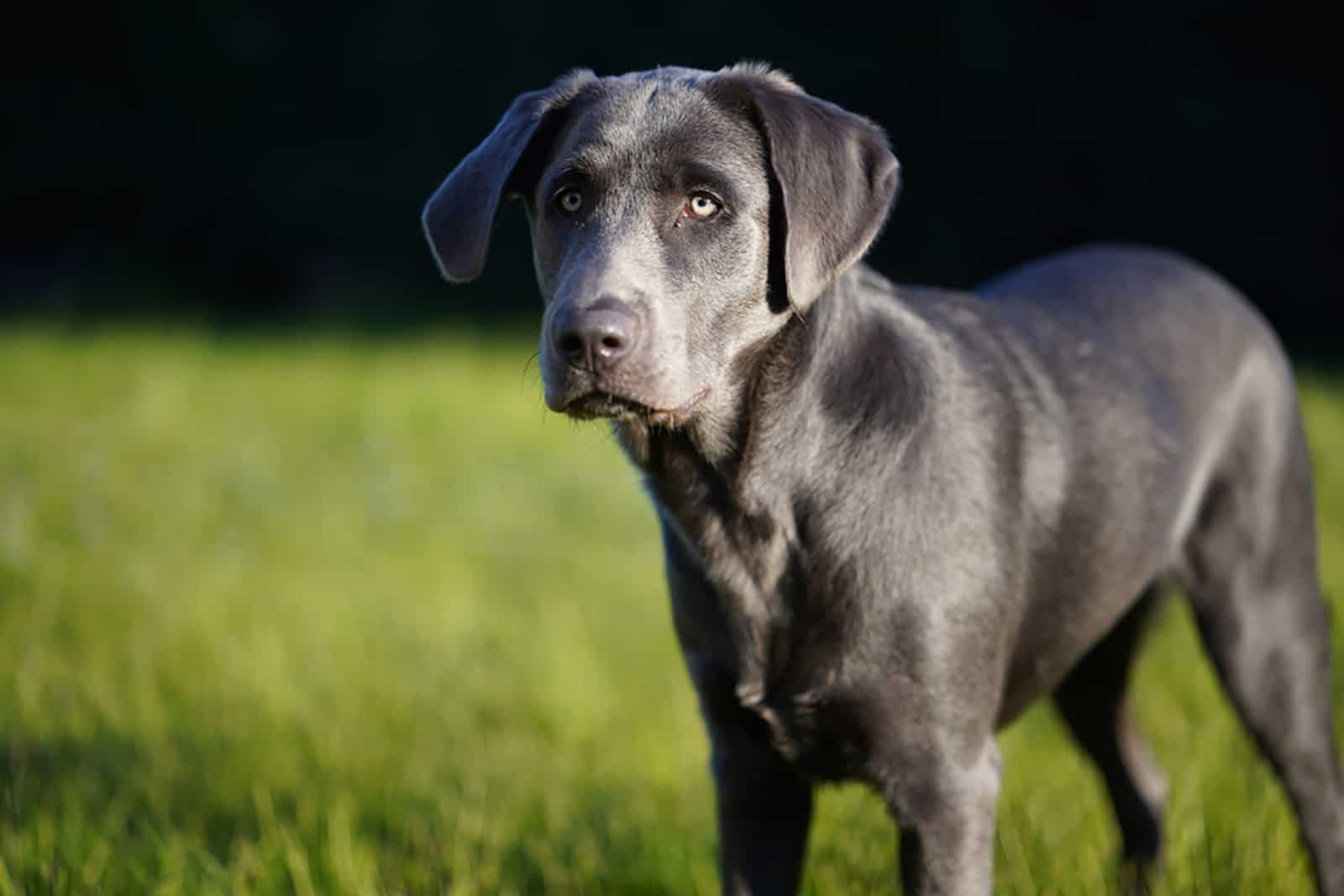
Due to a variety of health issues that charcoal Labradors are prone to, there is a chance of a decrease in their longevity.
The average lifespan of a charcoal Lab is 9 to 12 years, but keeping it healthy may prolong what is considered its maximum age.
Luckily, reputable breeders are putting all of their efforts into making the Labrador Retriever breed healthier and more resistant to hereditary health problems.
By working together, Lab breeders and veterinarians are slowly but surely eradicating breed-specific health issues that are present in this beautiful dog breed.
Are Charcoal Labs Recognized By The AKC?
The short answer is yes, but let’s go back to the whole charcoal Labs are a diluted black Labs story. While charcoal Labs are recognized by the American Kennel Club (AKC), they are not labeled as “charcoal”.
In fact, the AKC labels charcoal Labs as black Labs.
So, if you happen to own a purebred charcoal Labrador Retriever, check its pedigree. There should be “black Labrador Retriever” written on it.
According to the official AKC Labrador Retriever breed standard, the charcoal coat color is not considered a standard color. That means that charcoal Labrador Retrievers are not eligible to participate in dog shows.
When it comes to miniature Labradors, none are recognized by the AKC (no matter the coat color).
Where Can I Find A Charcoal Lab?
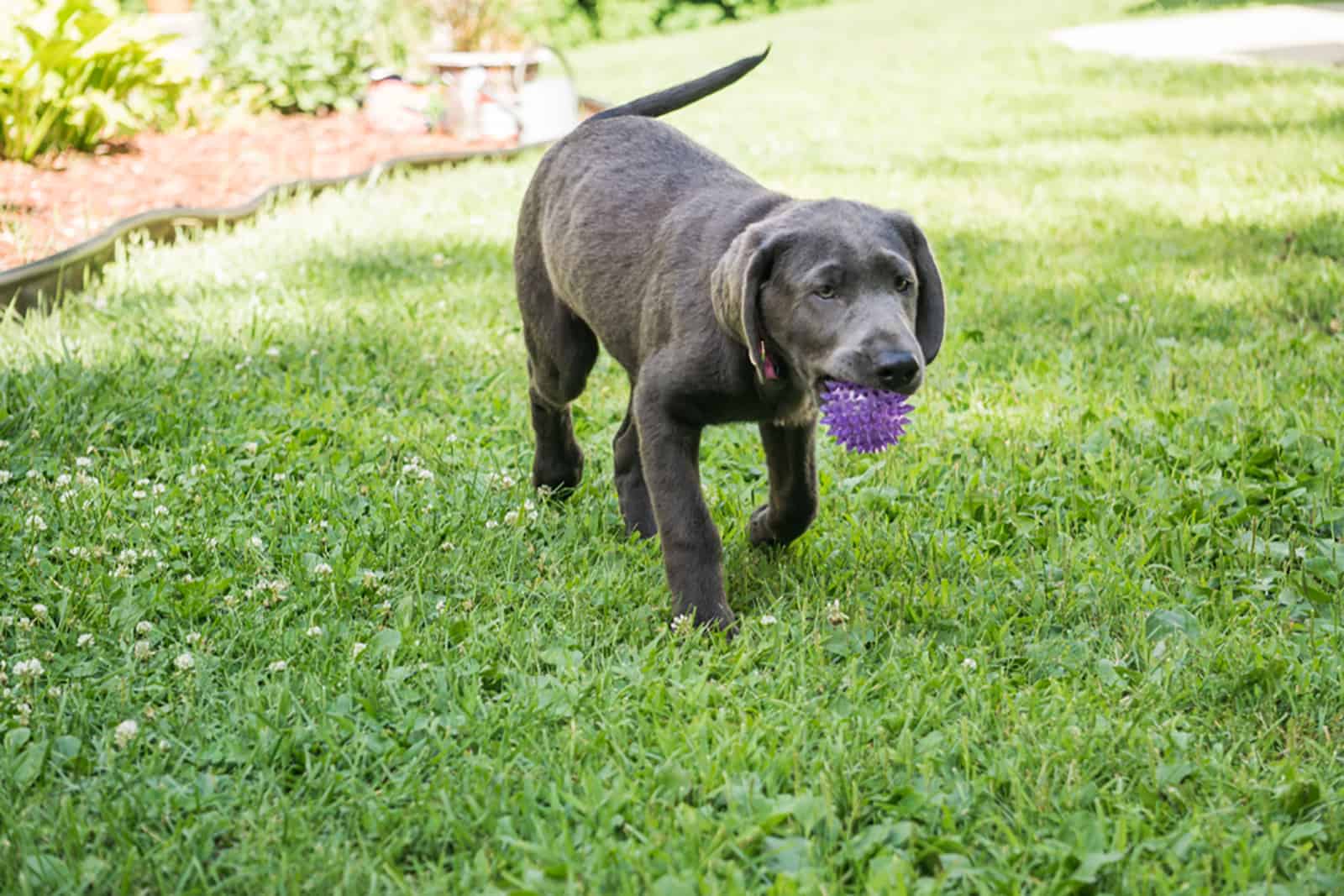
Searching for a charcoal Lab is like searching for a rare gem! You are more likely to find yellow Labs, black, chocolate, or even fox red ones! But that does not mean that you should stop looking for a charcoal Lab.
Here is the thing — you can find a charcoal Lab easily by typing “charcoal Labs for sale” but that’s not a way to do it. Why?
Because there are so many unethical and irresponsible Labrador breeders that produce loads of Labrador puppies with health issues. You don’t want to support those kinds of Labrador breeders who will sacrifice their puppy’s health for money.
Instead, search for reputable Labrador Retriever breeders in your area, do not be specific about the color. I know we are here to talk about the charcoal Lab, but when it comes to finding the right breeder, it all comes down to a little research.
Not only will reputable Labrador Retriever breeders have puppies of different coat colors, but they will also perform a series of health checks on all foundation dogs and their puppies.
Ethical Lab breeders make sure that each Lab puppy gets the best start possible — no matter the coat color.
Once you get in touch with such Lab breeders, finding your charcoal Lab puppy will be easy!
How Much Does A Charcoal Lab Cost?
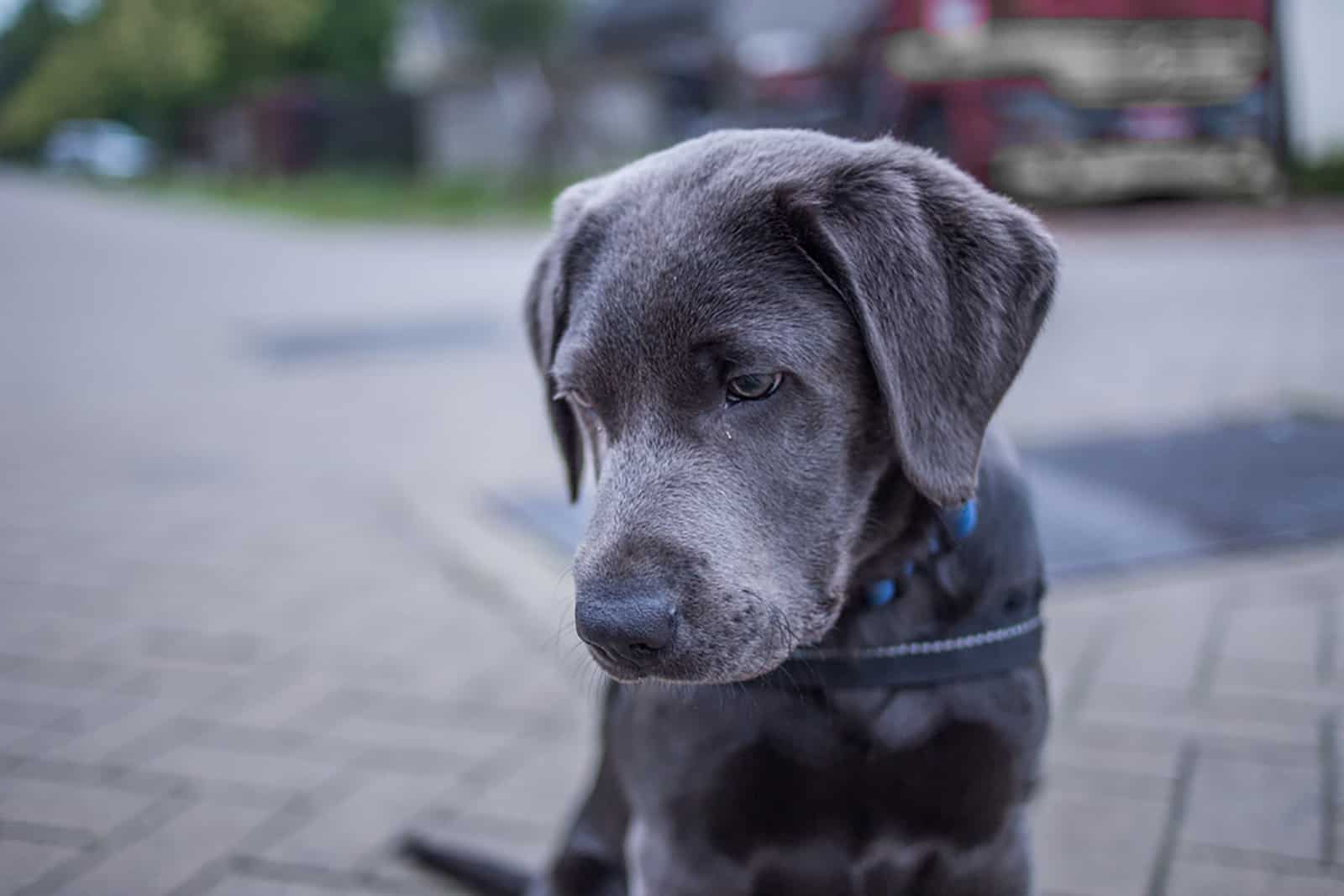
Now that we have mentioned the bad and the good Labrador Retriever breeders, let’s see how much they value charcoal Lab puppies. On average, charcoal Labrador Retriever puppies cost roughly $1500.
You are probably aware that “rare” coat colors in all dog breeds are usually higher in price (which makes no sense, really), and that these coat colors are usually most sought after.
Now, depending on their color, Labrador puppies can range in price:
• Yellow Lab: $1000-$1300
• Black Lab: $1000-$1200
• Chocolate Lab: $1000-$1300
• White Lab: $1000-$1400
• Charcoal Lab: $1000-$2000
• Silver Lab: $1000-$2000
• Fox-red Lab: $1000-$1300
The charcoal Lab is not as popular as the yellow or champagne Lab. However, paw lovers still ask around about where and how much the charcoal costs.
As you can see, when compared to other Labrador colors, the charcoal Lab is not as expensive.
Its price, however, depends on your location and the Lab breeder’s experience, the quality of the breeding program, as well as their competence.
What Is The Rarest Color Of Lab?
If you think that charcoal Labs are the rares, well let me disappoint you by saying that silver Labs are considered the rarest Labrador Retrievers out there!
People often mistake charcoal Labs for silver Labs which instantly makes charcoal Labs rare, right? Well, think about it, how often do you see a charcoal Lab?
What Are Some Other Colors Of Lab?
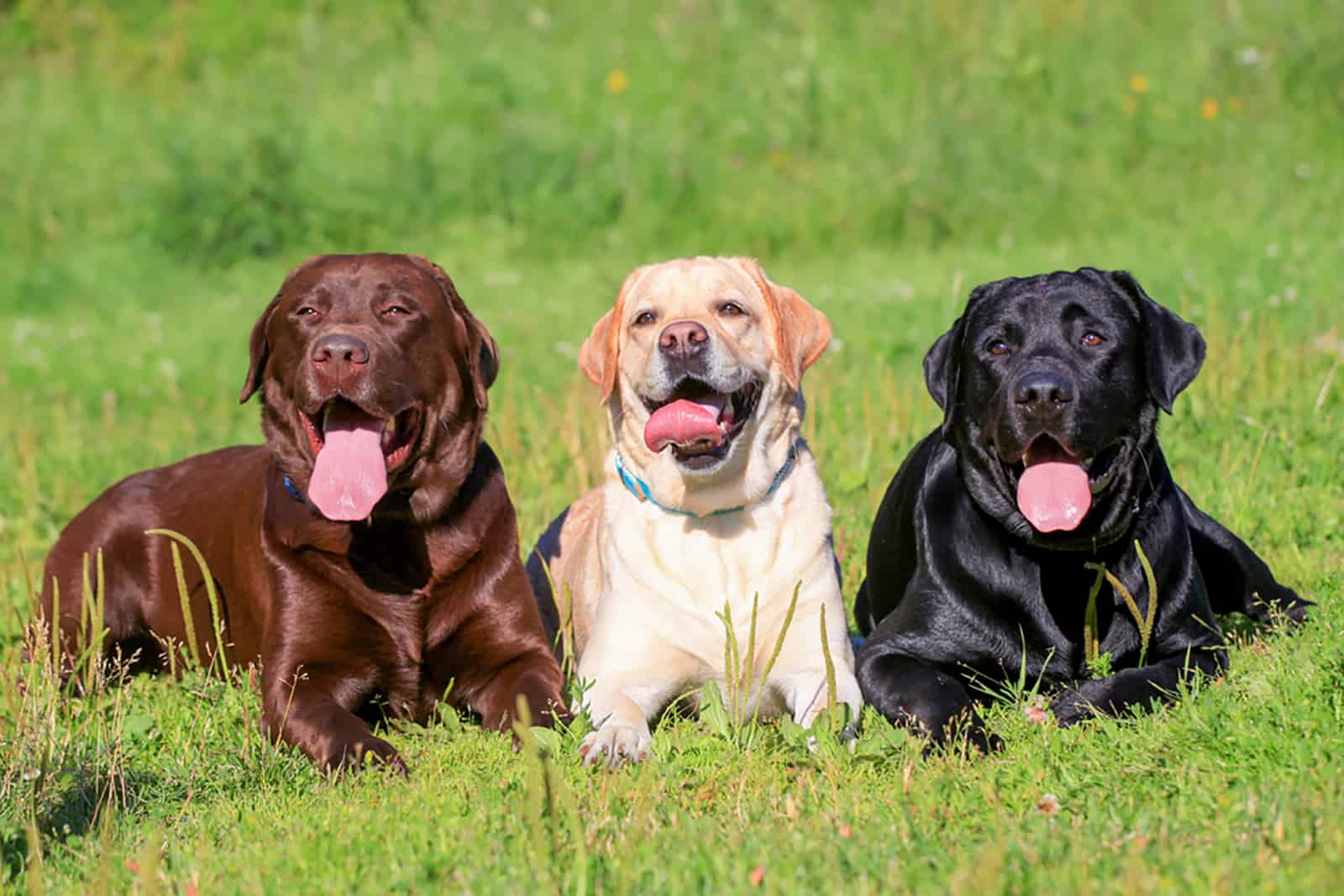
Besides charcoal, there are other Labrador Retriever colors that you probably already know of. First off, the standard Labrador colors that we often see include:
• Yellow
• Black
• Chocolate
Now for the rare and unusual ones — Labrador Retrievers come in a variety of different shades such as:
• Champagne
• White
• Charcoal
• Silver
• Black and tan
• Brindle
• Chocolate and tan
Mind you, some of these rare Lab colors can be a result of crossing another breed with a purebred Labrador Retriever. That said, if you are looking for a show-quality Labrador, make sure to choose between the standard three colors.
Caring For A Charcoal Lab
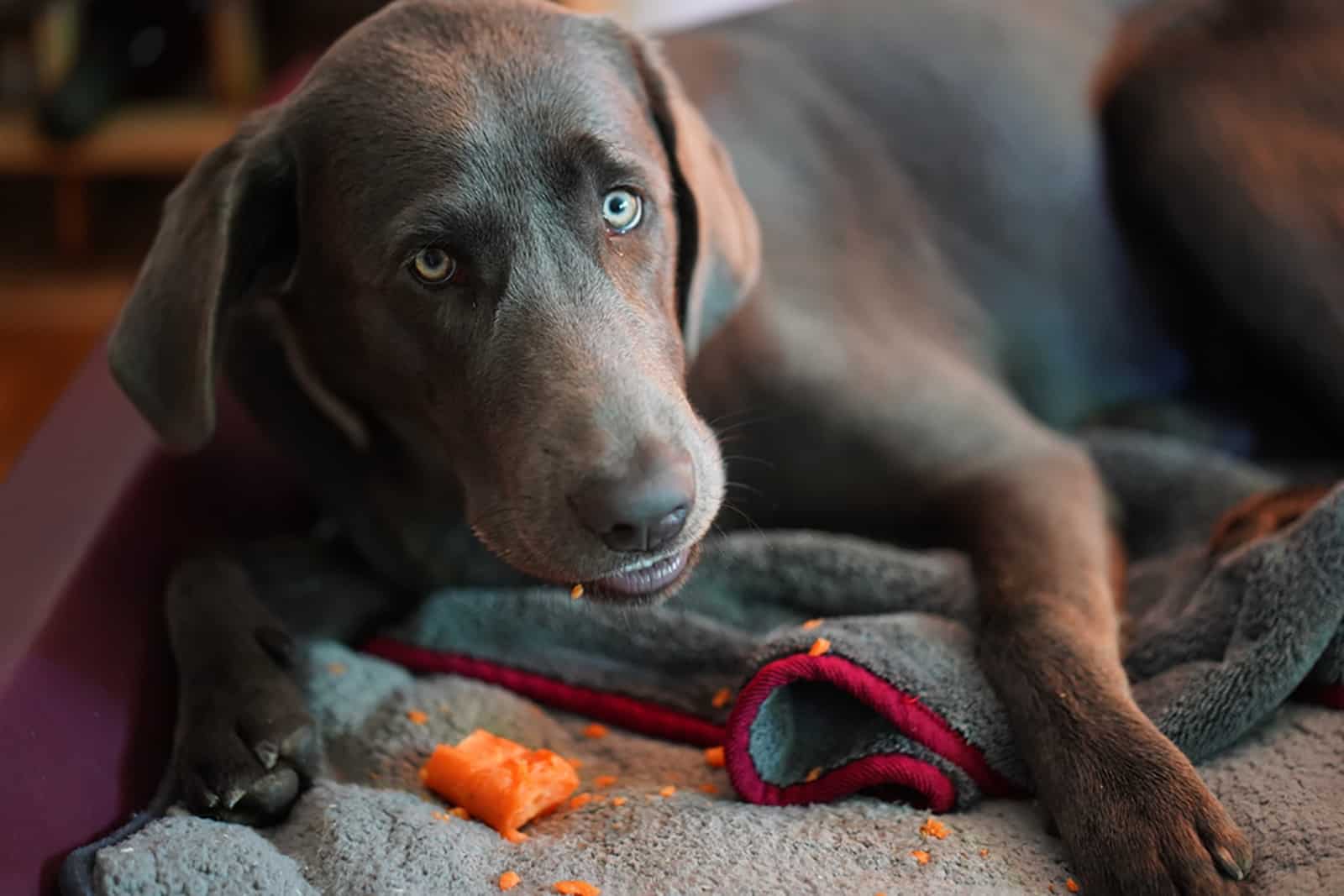
Now for the fun part — what does it take to own a charcoal Labrador Retriever? If you want your charcoal Lab to be the best dog in every possible way, then you need to spend some time properly caring for it.
Here are some tips and tricks to help you maintain your charcoal Lab:
Healthy Diet
No dog can thrive on only plain dog food and kibble — every dog needs and deserves so much more! So does the charcoal Lab.
Due to the fact that the charcoal Lab grows pretty fast, it needs plenty of high-quality food to keep its body going! This is why aspiring charcoal Lab owners should follow a Labrador feeding chart.
It is not only about what you feed your charcoal Lab, it is also about how you feed it. Each charcoal Lab needs a proper feeding schedule in order to maintain a healthy weight.
Keep in mind that charcoal Labs are prone to obesity and make sure not to overfeed your pooch! That said, don’t underfeed it as well!
Proper Training And Exercise
These two go hand-in-hand because charcoal Labs exercise while they are being trained! The majority of charcoal Labs are driven by food.
So, incorporating yummy dog treats into charcoal Lab training will get you the best results. Again, make sure not to overdo it because Labrador treats are high in protein and fats!
As we mentioned earlier in this article, charcoal Labs are extremely intelligent and enjoy having some work to do (unlike us).
You will have to keep your charcoal Lab puppy entertained in order to avoid destructive behavior and boredom.
Also, it is important for you to know how to balance charcoal Labrador training, exercise, and feeding. As a large dog, the charcoal Lab is prone to developing canine bloat, which is extremely dangerous.
It usually happens when charcoal Labs head on a running spree straight after a meal. That said, make sure to give your charcoal Lab a break after it has just eaten.
Grooming
Another way to keep a charcoal Lab healthy, happy, and tidy is by grooming its double coat. Due to the fact that the charcoal Lab is a moderate shedder, you will want to brush its coat every day.
Trust me, it will minimize the amount of little, short, charcoal hairs that you find everywhere around the house. Charcoal Labs inherit a thick coat that may be a challenge for one person to maintain.
Other than brushing, you don’t really have to bathe your charcoal Lab that often, unless it rolls into dead stuff. Most charcoal Labs that are kept indoors can be washed every month or two, depending on their activity levels.
I mean, if your charcoal Lab comes home all covered in mud, of course, you are going to bathe it!
A plus here is that charcoal Labs enjoy the water — they are water dogs, duh! But, some charcoal Labs may not enjoy the shower as much as they enjoy a good ol’ lake!
If you are a new Labrador Retriever owner and are not sure how to bathe and brush out the charcoal Lab’s hair, do not hesitate to contact a professional breeder. They will help you out and give you tips on how to maintain your charcoal Lab’s coat carefree.
Regular Health Exams
You are aware of all the potential health issues that are lurking within the charcoal Lab’s genetics. This is why you should be consistent with taking your charcoal Lab to the vet.
You don’t have to wait until it gets sick — you can take your charcoal Lab for yearly health exams just to be on the safe side. That way, you are keeping an eye out for any changes in your charcoal Lab’s physical and mental state.
Once you teach your charcoal Lab puppy that the vet is nothing to be afraid of, it won’t be an issue taking it into the vet clinic once it reaches adulthood.
Let’s Wrap It Up
Let’s be real — the charcoal Lab is one of the coolest dogs you will ever see! I mean, who wouldn’t want one? These charcoal-colored puppies are capable of making everyone’s day better!
Not only is the charcoal Lab a great companion, but this dog is a versatile canine that can do all kinds of stuff! From retrieving games to babysitting your kids — the charcoal Lab is a super dog!
Due to the fact that the charcoal Lab is such a fast learner, you will have no trouble in teaching it many tricks. Its loyalty and obedience is what makes the charcoal Lab a dog to consider owning, if you are okay with a little bit of dog hair here and there.
Other than its shedding amounts, the charcoal Lab is a big dog that may require a more spacious apartment/house.
On the other hand, charcoal Labs can do well in smaller apartments as long as they receive plenty of outdoor exercise throughout the day.
Related Content
Top 5 Best Fox Red Labrador Breeders In The U.S.
Dudley Labrador: Everything You Need To Know About The Pink Nose Lab
